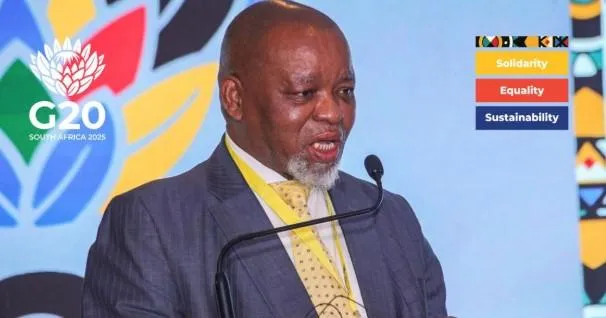South Africa rallies Africa behind global push for critical minerals framework at G20 Dialogue
G20

Speaking at the G20 Critical Minerals Framework Partnership Engagement on Tuesday, Minister of Mineral and Petroleum Resources Gwede Mantashe said Africa stands at a pivotal moment as demand for strategic minerals reshapes the global economy.
Image: Supplied
South Africa has called for deeper international cooperation to ensure that the global race for critical minerals supports sustainable development, industrialisation, and shared prosperity across Africa.
Speaking at the G20 Critical Minerals Framework Partnership Engagement on Tuesday, Minister of Mineral and Petroleum Resources Gwede Mantashe said Africa stands at a pivotal moment as demand for strategic minerals reshapes the global economy.
Mantashe noted that the world is undergoing a profound structural shift driven by the transition to clean energy technologies, with demand for minerals such as lithium, cobalt, graphite, and rare earth elements expected to more than double by 2040.
Alongside these are the more traditional yet equally critical minerals such as gold, coal, and diamonds, all of which Mantashe said continue to anchor Africa's economies and provide the much-needed employment.
Mantashe said Africa, home to at least 30% of global reserves, is uniquely positioned to benefit but only if it breaks away from traditional “pit-to-port” models that export raw materials with limited value addition and minimal participation in global mining value chains.
“However, despite this abundance, the continent remains largely trapped in pit-to-port models, with limited beneficiation and minimal participation in global mining value chains,” Mantashe said.
“This historical pattern has left us contending with underdeveloped infrastructure and unequal access to downstream economic benefits, as supply chains remain concentrated in a few industrialised economies.”
To address this, South Africa has developed a Critical Minerals and Metals Strategy, intended to shift the country from a raw-mineral exporter to a player in global processing, manufacturing and supply chain integration.
Mantashe said this strategy has shaped the country’s priorities during its G20 Presidency.
He said the G20 Critical Minerals Framework, currently being negotiated among member states, industry leaders and development partners, aims to establish transparent, inclusive and sustainable critical mineral supply chains.
The framework is built around six pillars, which are: mapping and exploration, governance and ESG standards, investment and local development, resilient and diversified value chains, innovation and technology, and skills development and knowledge exchange.
One of the most pressing issues, Mantashe noted, is closing the exploration financing gap, which has hindered many resource-rich developing countries. Early-stage exploration remains high-risk and often underfunded.
“To close this gap, the framework calls for greater investment in geological surveying and exploration initiatives in under-served regions – facilitated through development banks, regional geological agencies, and existing financing mechanisms,” he said.
“In South Africa, we are beginning to see encouraging cooperation between government and industry through the Junior Mining Exploration Fund, established to support junior companies facing barriers to meaningful exploration.”
A central pillar of the G20 framework focuses on strengthening governance, combating illicit activities and promoting responsible mining, ensuring that mineral extraction contributes to broad-based development.
Another major focus is empowering developing countries to climb the value chain by investing in local refining, localised manufacturing, and infrastructure that supports in-country beneficiation.
Mantashe emphasised that national sovereignty must be respected as countries pursue domestic industrialisation. He said skills development and knowledge exchange were also identified as essential for building the processing and technological capabilities required to compete in emerging mineral-based industries.
While negotiations have faced disagreements, especially regarding climate language, trade principles, and inclusivity, Mantashe said the global community recognises that critical minerals are now indispensable to economic and political cooperation.
“However, there is a broad consensus that critical minerals have become an essential domain for international cooperation. For that reason, there is a collective willingness to adopt the framework as a starting point for continued development under future G20 presidencies,” Mantashe said.
Tuesday’s engagement, hosted with the United Nations Development Programme (UNDP), forms part of a broader effort to align Africa’s priorities ahead of the upcoming G20 Leaders’ Summit. It follows the successful G20 Critical Minerals Stakeholder Engagement held in July.
Mantashe expressed confidence that the discussions will “translate policy commitments into practical action” and reinforce collaborative ties among governments, industry, regional bodies and development institutions.
BUSINESS REPORT